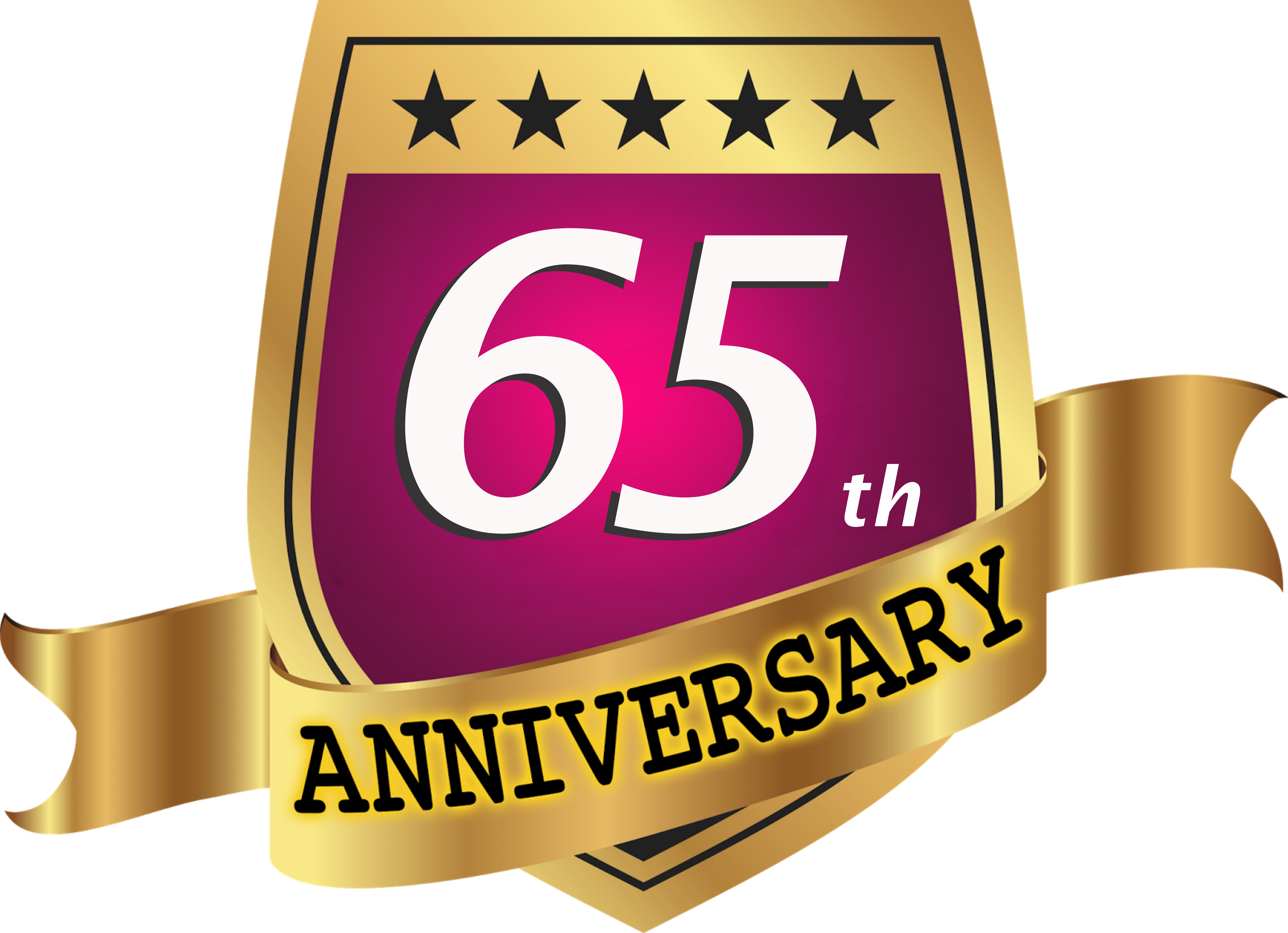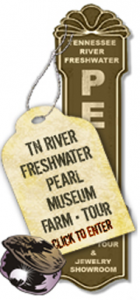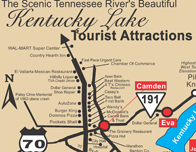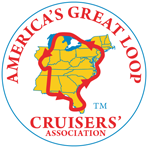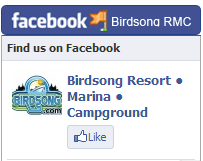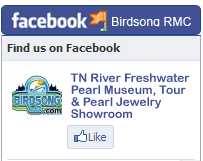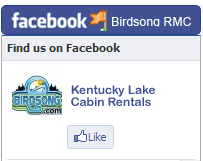Birdsong Prior to 1961
Birdsong Dock
The Early Years
As I remember them
By: James Keightley
Copyright 2002. All or part may be used with credit to author
Foreword
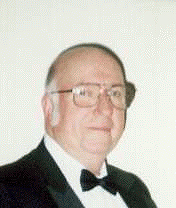 In many ways, it is very difficult for me to record these memories because it brings back the recollections of so many, many wonderful people who shaped and guided my life in those formative days. It breaks my heart to find that most have now passed away and all that remains for me are the fondest memories that a person can have. The years that I lived at Birdsong are the fondest of my childhood. What a wonderful place for a young person to grow up!
In many ways, it is very difficult for me to record these memories because it brings back the recollections of so many, many wonderful people who shaped and guided my life in those formative days. It breaks my heart to find that most have now passed away and all that remains for me are the fondest memories that a person can have. The years that I lived at Birdsong are the fondest of my childhood. What a wonderful place for a young person to grow up!
I had the pleasure of visiting the place in the summer of 2000. I went there knowing that there would be changes, it has been wisely said that you can’t go home. I realized there had to have been changes after the better part of 50 years. What I could not have been prepared for was the wonderful and warm reception that I received from the present owner, Bob Keast. He made me feel like visiting royalty. Thanks Bob! As the Lord gives me time, I will be sure to visit again and perhaps do some fishing too. I still remember some of the better spots around and I also remember many of the names given to the different landmarks…….. Ella’s Island, Smith’s Cove, Liz’s Cove, Baker’s Bay, Badger Bay, Fuqua’s Cove…….. On and on the list goes.
At the time of this writing, I live in the foothills of Mt. Adams in Washington state with Carol, my lifetime best friend who is also my wife. We are listed in the phone book for White Salmon, WA and would love to hear from any of the friends from my days at Birdsong or anyone interested in talking about the place and the early days. Also, if you have pictures of those early days, please let me know. It would be a blessing to have copies.
Jim Keightley
The People
The story of Birdsong would be very incomplete without getting an idea of the people who spark plugged the whole thing, who searched far and wide for the “perfect location” and when they found what they were looking for, made it happen.
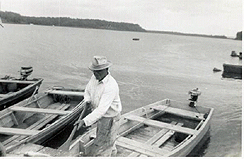 William Smith Keightley was my father and an avid sports fisherman. He was a native of Owen county Kentucky. For as long as I can recall, he would venture forth to spend as much time as his busy schedule as a funeral director would allow. After hours, he would go to the local lakes and “thrash the banks” for bass and occasionally do some still fishing for crappie and blue gill. Usually, he would go with one of his friends, leaving the family car at home so that Mom could drive to the fishing site to fetch him should there be a funeral call. There were no pagers or cell phones in those days. There was call forwarding however. One could crank the phone and tell the operator that we would be at one of the neighbors home for the evening and please forward any calls to us there. A great bridge player. An original investor.
William Smith Keightley was my father and an avid sports fisherman. He was a native of Owen county Kentucky. For as long as I can recall, he would venture forth to spend as much time as his busy schedule as a funeral director would allow. After hours, he would go to the local lakes and “thrash the banks” for bass and occasionally do some still fishing for crappie and blue gill. Usually, he would go with one of his friends, leaving the family car at home so that Mom could drive to the fishing site to fetch him should there be a funeral call. There were no pagers or cell phones in those days. There was call forwarding however. One could crank the phone and tell the operator that we would be at one of the neighbors home for the evening and please forward any calls to us there. A great bridge player. An original investor.
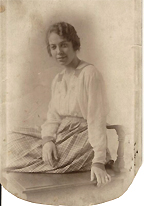 Marguerite Alexander Keightley was my mother and a native of Owen county Kentucky. My recollections were of total support of Dad in every aspect of life. A stay at home Mom, she was an Oldham county correspondent for the Courier Journal/Louisville Times when we lived in LaGrange, KY as well as an occasional contributor to the Oldham Era. We lived in LaGrange until I completed the 7th grade. It was her efforts at doing the million and one things necessary to make an operation like Birdsong move smoothly ahead. Mom was also an excellent bridge player and an original investor.
Marguerite Alexander Keightley was my mother and a native of Owen county Kentucky. My recollections were of total support of Dad in every aspect of life. A stay at home Mom, she was an Oldham county correspondent for the Courier Journal/Louisville Times when we lived in LaGrange, KY as well as an occasional contributor to the Oldham Era. We lived in LaGrange until I completed the 7th grade. It was her efforts at doing the million and one things necessary to make an operation like Birdsong move smoothly ahead. Mom was also an excellent bridge player and an original investor.
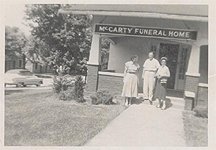 Arch McNeal This was my uncle. His home was in New Castle, KY. He and Aunt Mildred (Dad’s sister) were avid fishers and came spring and fall and stayed long. He helped Dad build all manner of items including dozens of John boats that were placed into rental service. His full name was Archibald Crutcher McNeal. He had retired as a State Farm Insurance agent in Henry county. Some of my fondest memories are of Dad, Uncle Arch and me fishing for bass along the shoreline across from the dock
Arch McNeal This was my uncle. His home was in New Castle, KY. He and Aunt Mildred (Dad’s sister) were avid fishers and came spring and fall and stayed long. He helped Dad build all manner of items including dozens of John boats that were placed into rental service. His full name was Archibald Crutcher McNeal. He had retired as a State Farm Insurance agent in Henry county. Some of my fondest memories are of Dad, Uncle Arch and me fishing for bass along the shoreline across from the dock
Jerry Meyers. Jerry was a very close friend of the family and the operator of a hardware store in LaGrange by the name of “Jerry’s Corner Store.” The store itself is long gone but the building that it was in is still there and in use at the time of this writing. Jerry was an original investor.
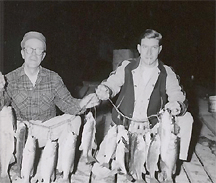 Perry Meyers, Jerry’s brother, worked for the postal service in the maintenance department. In Louisville. He was a regular visitor and a true friend. He would come down several times each year and take home outboards that were out of service for whatever reason. The next visit, these motors would be in the trunk of his car when he arrived and they would be running like new again. Most often, his wife Anna Laura would be with him and they would be out on the lake for the early bite and again for the evening feed.
Perry Meyers, Jerry’s brother, worked for the postal service in the maintenance department. In Louisville. He was a regular visitor and a true friend. He would come down several times each year and take home outboards that were out of service for whatever reason. The next visit, these motors would be in the trunk of his car when he arrived and they would be running like new again. Most often, his wife Anna Laura would be with him and they would be out on the lake for the early bite and again for the evening feed.
Cecil Staples was a long time friend of Dad’s and a fishing companion of several decades. Cecil was a skilled carpenter and construction site manager.
Thomas Manby, Sr. of LaGrange was our good friend and family attorney. Tom was one of the original investors, put the corporation together and kept it running legally. A good fisherman.
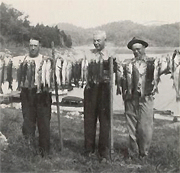 Reed Howard was a family friend of many decades. He owned “Burial Dress Company” in Louisville. He and Dad became friends through contact in the funeral business. Reed was a world class fisherman and today could be a professional sports fisherman. Soft spoken with a sharp wit.
Reed Howard was a family friend of many decades. He owned “Burial Dress Company” in Louisville. He and Dad became friends through contact in the funeral business. Reed was a world class fisherman and today could be a professional sports fisherman. Soft spoken with a sharp wit.
Elizabeth Thomas Carroll was a friend and an avid fisher. We met Liz while she was a practicing registered nurse in LaGrange at Mallory Taylor Memorial Hospital. She was an original investor and lived at Birdsong for several months.
Emmet Mann was a family friend and in the construction business in the LaGrange area. He spent nearly a year at Birdsong while the first buildings were under construction.
Larry Evans was a friend of the family for many years. A great fisherman and a very mischievous sense of humor. Larry was a bachelor and an original inves
Logan Tandy came into our lives after we had moved to Birdsong. He was a business associate of Larry Evans. A frequent visitor and fisherman. Eventually, Logan bought up all of the stock and briefly ran the operation before selling out entir
Julian Cuthbert Alexander was my Mom’s brother. After the war, he moved to LaGrange with his bride and infant daughter, renting a place across the street from the funeral home in which we lived. He was a civil engineer and was the person who helped Dad locate Birdsong and was the first person to reside on the property. Uncle Alex was a true southern gentleman and an original investor. In this picture is Aunt Jean holding Julie Ann, my first cousin and Uncle Alex in uniform. He was just home from WWII.
Robert “Wee” and Francis Brown of Nashville. This wonderful couple visited nearly every weekend. Both were dedicated fishers and good at it. Not only were they good customers, they were close friends and many nights in the off season, they were down just for a visit. My folks and the Browns would be the only ones there for dinner in the Lodge and bridge afterward. As I recall, Robert worked for the Nashville Tennessean/Banner as a lead pressman.
J. D. Baker was a local in his early twenties when we moved to Birdsong. He worked tirelessly on the early construction.
Bernice Baker was J. D.’s older brother and also worked on the construction crew. We kept in touch with the Baker Brothers for many years after we left the area but I have since lost contact.
Brents and Ella Mathis of Nashville. When we first met them, Brents was a photographer for the Tennessean. He and Ella were very dedicated fishers and visited frequently. They preferred to go out later in the morning and stay later.
Chapter Two
Before the Beginning
The dream of operating a “fishing camp” had been in Dad’s mind for many decades and in the early 40’s he began to look around for an opportunity. Many of his friends shared the vision of being part of what was called in those days a “fishing camp.” How different things are today. Of course, World War Two was in full swing and gas was rationed, making it somewhat difficult to get around. However, the funeral home in which Dad was a partner and in which we lived, had several commercial vehicles associated with it and they had the “T” rationing stickers and a bit more liberal gas rations. Gas could be stored in barrels for use at a later time such as when an “emergency” fishing trip demanded.
As time permitted, Dad and his companions began to go further afield looking for just the right location. I was very young and many of the memories are clouded by time and some, I am sure, are completely gone. I do recall that we got as far south as Silver Glenn Springs in Florida and there were a couple of sites in Minnesota that were fished while on these searches. There were locations in Arkansas that were checked out and we visited Dale Hollow several times. Those trips included Wisdom Dock, Hendricks (both still in operation in 2002) plus several undeveloped areas with promise. There were trips to Reel Foot Lake as well as locations on the Ohio, Cumberland, Mississippi and Missouri Rivers. Back to Florida and a visit to Lake Okeechobee. To Georgia/Florida and the Okefenokee Swamp area. We visited Pickwick Lake and Old Hickory. Wonderful trips all and lots of great fishing and some good catching too but still not “the place.”
In the fall of 1947, Dad and Uncle “Alex” Alexander went for a trip to west-central Tennessee to a brand-new man-made lake that had been created when the Tennessee River had been impounded by the Tennessee Valley Authority when they installed a dam near Gilbertsville, KY. The visit included one of the regional offices of TVA at Paris, TN and inquiries were made concerning sites available for developing sports fishing facilities. They were given information on a few and set out to look them over. The second place they came to was located on the shores of Birdsong Creek (it was referred to us by TVA as two words and the original lease was penned by them in that fashion) not too far from Camden.
There were no facilities of any type around and they spent the entire afternoon looking around until darkness forced a halt to their reconnoitering. They went into Camden and took a room at what was then called Lockhart Court.
The next morning found them back at Birdsong with lines in the water for the morning bite. By midmorning, they were walking the property and considering the possibilities. They located the property lines of the proposed lease and before they realized it, another day had passed and it was well after dark when they began their return to LaGrange. However, both were in agreement. This was the place.
In the next weeks, the word went out to all of the fishing friends that Smith had found a “hot location” and many of these friends visited the Birdsong site. The fishing was unbeatable and everyone who visited came away with a great report.
I should point out how difficult it was to fish Birdsong at that time. The friends who visited Birdsong at this time were very dedicated to fishing. There were no facilities of any kind. Boats on trailers were few and far between.. Car top boats were in their infancy and were heavy and cumbersome. The car top racks of the day were privative and most who car-topped had scratches and dents on the roof of their cars to show for their efforts. Boats, motors, gasoline, food, drinking water and sleeping gear had to be brought in with each party. There were no cooking facilities and a portable stove had to be brought along or one had to cook over a campfire. There were no restaurants closer than Camden which was also the closest overnight lodgings. At that time, the road was gravel and there were no bridges over the numerous streams; one forded and then carefully dried the brakes.
Cecil Staples had one of the few trailered boats. This was a 14 foot flat-bottomed outfit that he took on one early trip and then left it hidden in some brush for others to use during the summer. All the fishing buddies used it and this greatly reduced the burden of outfitting. This boat got more water miles that summer than it had in its entire life. It was launched from the end of “old Birdsong road” that now seems to be called Buck N Bass Rd. At that time, it simply dead ended in the lake.
Dad began putting things together and after many meetings and endless hours in the office of attorney Tom Manby, papers came forward that created Birdsong Dock, Inc.
It had begun.
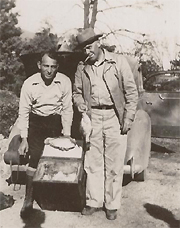 Arthur Blandford and Smith Keightley on an early visit to Birdsong before development had begun
Arthur Blandford and Smith Keightley on an early visit to Birdsong before development had begun
Chapter Three
The Beginning
The corporation that emerged from all of the meetings elected Smith Keightley as President and CEO. I do not recall who the rest of the officers were but it seems to me that Mom was Secretary/Treasurer. A 99 year lease of the property was signed with TVA and included a 25 mile shoreline exclusion in all directions that prevented the establishment of any other competing business. There were 37 acres of land that had lots of trees and acres of “broom straw.”
It is very difficult for me to describe what was ahead for these people. There were no roads, not even farm lanes. The only access was along the old Birdsong road. This road formed one boundary for much of the property. Where this former right of way ended in the lake afforded us our only easy access to the water. Included in the lease was the point of land that lies northeast of this road.
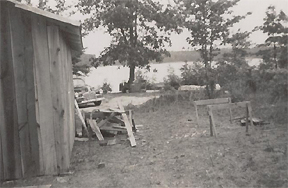 It was decided that Uncle Alex would go down and get things started by surveying all of the property and get some plans drawn up for development. To do this, he would have to construct a building suitable for temporary living and large enough to house all of the tools that he would need. This he did by framing a structure that he situated upon cement blocks and then used “board and batten” siding. The building was some 12 feet wide and perhaps 25 feet long. He made bunks in the back for himself and some of the visiting fishing friends. There was no electricity (REA was coming but had not reached the site). Coleman or Aladdin lanterns provided light in most of the homes in the area at the time. Cooking was done on an oil stove. A privy was built some distance away. These were the first structures on the property. Both are long since gone. (Photo: The first building with Smith Keightley’s 1941 Pontiac in the back ground)
It was decided that Uncle Alex would go down and get things started by surveying all of the property and get some plans drawn up for development. To do this, he would have to construct a building suitable for temporary living and large enough to house all of the tools that he would need. This he did by framing a structure that he situated upon cement blocks and then used “board and batten” siding. The building was some 12 feet wide and perhaps 25 feet long. He made bunks in the back for himself and some of the visiting fishing friends. There was no electricity (REA was coming but had not reached the site). Coleman or Aladdin lanterns provided light in most of the homes in the area at the time. Cooking was done on an oil stove. A privy was built some distance away. These were the first structures on the property. Both are long since gone. (Photo: The first building with Smith Keightley’s 1941 Pontiac in the back ground)
There was an abandoned well nearby and that would be the water source for the first several months. Before it could be used, the Baker brothers were hired to clean it out. Their method was to construct a framework over the opening with two pulleys attached to it. They each used a conventional galvanized bucket and began to pull bucket after bucket of water from the well. I remember that after several hours of this backbreaking labor, one could shine a flashlight down into the well and see the stream of water at the bottom. One of the brothers, I think it was J.D. was lowered down into the well and some scrap wood and a few other pieces of debris were removed. The well was in very good condition all things considered as it had been abandoned for several years. A wonder that varmints had not fallen to their deaths. However, whoever had last used it had boarded it off very well.
Uncle Alex had used the assistance of the Bakers to “drag chain” all over the place in order to get the surveying of the property completed. It took many days but there were few disappointments since Dad and Alex had so thoroughly examined the area before entering into the agreement. Finally, the survey was completed and the layout was begun and on a visit that I recently made, this general plat plan is essentially unchanged. The plan included locations for several cabins, a central bath house and a Lodge that would include a modest restaurant and four sleeping rooms.
Six flat bottomed, 12 foot fishing boats were bought during this time and we were in the boat rental business for the first time. For many years, I could recall the name of the first customer but it now eludes me now.
The visitors were already starting to show up. Fishermen are a hardy lot and not to be discouraged by rough conditions. Better access to the lake was needed and a dock was becoming a necessity. Alex laid out a floating dock built in two sections with oil barrels for floatation. This was launched and Birdsong could reasonably be called Birdsong Dock.
The next step was to get a well drilled in the area where the development was to take place. A person was contracted to bring in a rig and pound a well. Recollection is fuzzy at this distance but I think he went down 53 feet and hit a good stream. However, it was really heavy with iron but usable.
Finally, a “build out” plan was devised and agreed to by the Board of Directors. It was something like this;
1. Tool shed. This is what Uncle Alex used for a residence the first summer. It was expected to have a useful life of perhaps five years. It was built in 1947.
2. Shop/Storage Building. This was to eventually be a shop facility, but storage during the construction phase. Expected useful life of ten to twenty years. Built in 1947.
3. Boat dock. This was built in the spring of 1948 with a life expectancy of five to eight years when it would be replaced with a covered facility with multiple slips. (The concept drawings that Uncle Alex presented were startlingly similar to what is in service today.)
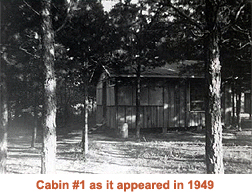 4. Cabin #1. This was to serve as a cook house for the construction crew and eventually a rental unit. Built in late 1948 with a useful life expectancy of seven to ten years by which time it was expected that all of the cabins would be updated and/or replaced with units with showers and toilets.
4. Cabin #1. This was to serve as a cook house for the construction crew and eventually a rental unit. Built in late 1948 with a useful life expectancy of seven to ten years by which time it was expected that all of the cabins would be updated and/or replaced with units with showers and toilets.
5. Bath house. This was anticipated to provide shower facilities until the time that all of the cabins were either equipped with bathrooms or the cabins replaced with units that were with showers and toilets. Built in 1948, there was pressure water there but no electricity at the time of construction. Hot water was provided by a kerosine fired water heater. It was one ofmy job to fill this heater twice daily.
6. Cabin #2. Was built for rental service in 1948. During the construction phase, it provided sleeping accommodations for the builders.
7. Cabin #3. This unit was also built in 1948 and Mom, Dad and I lived in it a few weeks after moving to the property in 1949 while work was going forward to complete the lodge.
8. Lodge. This building was under construction when my family moved permanently to the property. It was expected that this building would be replaced with a larger facility within 15 to 20 years
9. Cabin #4. This was also a rental unit and built in 1949.
10. Cabin #5. Built in 1950
11. Cabin #6. Built in 1950
12. Cabin #7. In 1950, the original tool shed that Uncle Alex had built was placed on log rollers and a tractor was attached. It was moved to a location on the “loop” and improved for the use of Uncle Arch and Aunt Mildred. They made it very cozy and finished it out very nicely. Others liked it and it went into rental service.
We wished to disturb as few of the trees that were on the property as possible so Alex routed the drives carefully around all that he could, laying out “loop” that would serve all of the cabin sites and still be as level as practical. A dozer was hired for the rough work and a horse drawn grader was found in the area to come in and spread the “Chirt” gravel that was delivered by dump truck. I recall that a few weeks later, he became dissatisfied with the grade in front of cabin #2 and cabin #3. The next thing I knew, a bunch of us were out there with picks, shovels and wheelbarrow’s digging by hand to bring the grade to his specifications. To this day, I do not know what difference this made in the driveway.
Late in 1948, REA power lines reached Birdsong and this greatly speeded up construction. A submersible pump was added to the well along with a large pressurized storage tank. “Tap water” was available for the first time. A water line was extended to the shower house and to the lodge. A line was extended toward cabin #1 to make it easier for the cook.
Around that time, Uncle Alex landed a job with the state of Missouri as State Water Resources Commissioner and moved to Jefferson City with his family where he remained for the rest of his life. However, he was still very much involved in Birdsong and the development. He would come in for long weekends and he would do his magic on the drawing board and with his transit.
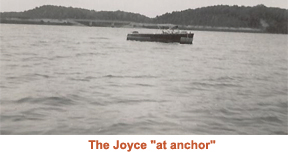
Chapter Four
Those that Built
It is time for another roster, this time of those who built the property.
Smith Keightley…………………………………….On-site General Manager
J. C. Alexander………………………………………….Civil Engineer
Emmet Mann…………………………………………Crew Foreman
Cecil Staples…………………………………….Carpenter & Supply Manager
Harvey Weeks………………………………………….Cook
Bernice Baker……………………………………….Laborer
J. D. Baker………………………………………………Laborer
There were others whose names have escaped my memory. I apologize for the omissions.
In order to get the project up and running so that income could begin to flow, it was decided local folks would be hired as much as possible and bring in only management and lead staff and some support staff. In the end, Emmet Mann (from LaGrange) was hired as foreman, Cecil Staples (from Louisville) would manage supplies as well as help with the labor and a black fellow by the name of Harvey Weeks (from LaGrange) would cook for the crew. There was one other whose name I have forgotten who was a carpenter. These folks would form the nucleus of the building crew. They would stay at least until the lodge was completed.
Local persons were hired to round out the construction staff. Bernice and J. D. baker were two of the first hired and continued to help around the place for as long as I lived there. There were several others and I recall only a few of the names now. Ray Hardin was one that I recall. He was a local commercial fisherman and worked as a casual laborer. Everyone worked from can see until can’t see and during those weeks, there was little time for fishing.
 Material was purchased in bulk, nails by the keg, lumber by the truck load and cement by the truck load of bags. This had to be mixed on site in a rented mixer as there was no ready mix in those days. Gravel and sand was delivered by the truck load. With so much building to do there was little reason to buy less than a pick up load of anything. Lumber was bought directly from the sawmill and by the semi-truck load where ever we found what we were in need of.
Material was purchased in bulk, nails by the keg, lumber by the truck load and cement by the truck load of bags. This had to be mixed on site in a rented mixer as there was no ready mix in those days. Gravel and sand was delivered by the truck load. With so much building to do there was little reason to buy less than a pick up load of anything. Lumber was bought directly from the sawmill and by the semi-truck load where ever we found what we were in need of.
An example of this is the pecky cypress paneling in the main room of the lodge. Cecil located a sawmill in southern Mississippi that was sawing this material and ordered a load. It was delivered directly to us and unloaded in front of the building. Two days later, it was being installed. This brings to mind the Johns-Manville rock wool insulation that was used in the walls. The stuff was what was “state of the art” then but terrible to deal with. No matter what one did to avoid the discomfort to your skin, the stuff caused itching that was almost unbearable. Also, with in a year or two, it had disconnected itself from the heavy paper backing and fallen into a heap on the bottom between the studs and was of no account what ever. A real bummer.
Harvey Weeks, the cook, was well known for his ability to turn our fine “labor camp” food and he certainly didn’t disappoint. He provided the workers with the best food anywhere around. By this time a few guests had discovered his ability and were eating with the construction crew. It was expected that Harvey would stay on, move his family down and cook in the lodge when it was completed. However, a conflict of personalities developed between Harvey and Elizabeth Carroll and he left just before completion of the building. Harvey had become a good friend of the family and we were very sorry that he left especially in light of the fact that Elizabeth only remained one summer before returning to LaGrange herself. I went to Camden with Mom to take Harvey to the Greyhound station so he could return to LaGrange. That was the last time I was to see him as he passed away in the very early 50’s.
Mom and I arrived early in the spring of 1949 and set up in cabin #3 until the lodge could be completed. We were seeing more customers so I kept the dock in operating order. Uncle Alex and Dad had built a small “motor house” on skids so that it could be moved away from the lake in case of rising water. This contained the necessities for the boat rental operation and became my domain. We also had barrels of gasoline at hand that I mixed according to the needs of the various motors. We started that season with the 12 boats I mentioned previously and three 3.2 horsepower Mercury outboards. This was heady stuff for a 12 year old. I was truly in my element.
One afternoon, Dad, the Baker brothers and I hooked up the utility trailer to the family car and went to a spot that had been recommended and loaded up with large rock for construction of the fireplace in the lodge room. This required several trips spread over about a week. Only one layer of rocks were placed as a time then the cement was allowed to cure. Emmet did the fireplace work early in the day and the work on the other parts of the lodge went along during the rest of the time.
Originally, since the building was to serve only a few years until such time as a permanent and much larger facility could be brought on line, the kitchen was designed into one corner of the main room. However, as construction progressed, it was decided to add a “wing” that would provide a much larger kitchen and living facilities for us (the Keightley’s). At the same time, an additional porch was installed. This had a much lower railing than the one on the lodge. This would allow one to sit in a lounge chair and still have a view. (This did not work out. No one ever had time to sit down) There needed to be a bathroom facility as well and that was added. Mom noted that she and Verne (the recently hired cook and general helper) had no place to wash the linens that were in constant demand by the cabins and sleeping rooms so a small basement was dug out and connections made for a washer and drier. TVA raised a real stink about that basement because it was actually below the number 6 contour line. This meant that it would be possible to flood that space should they raise the lake to its highest level. Dad pointed out to me that it was usually easier to get forgiveness than get permission.
At the time that the lodge was arriving at a point that it could be occupied, Dad called Abbott Transfer in LaGrange and in a day or so, they arrived with our family belongings. We moved into the lodge and set up housekeeping. Overflow family items were taken to the shop and stored. I moved into the room at the east end of the building farthest from the kitchen that was designed to be the registration room. With the exception of the coldest months, I slept in that room the entire time I lived at Birdsong.
 While Dad and the rest of the workers built, I rented boats, sold worms and minnows, vended temporary fishing licenses, mixed gas, rented motors, changed spark plugs and did the dozens of things that goes into operating a fishing camp. I will tell you that it was different from anything that I had ever done before. The day usually began at around 4:00 AM by going into the lodge and plugging in the coffee maker (Mom would it set up before she retired for the night). Then to the dock to await the arrival of the first wave of fishermen. These were the diehards that had to be at “their hole” before first light. I remember many times when I would be awakened by a tap on my window. There in the gloom would stand some would be fisher wishing to rent a boat and be away well before daylight. Down the hill I would go, load up a boat with life preservers, paddles, spare gas and well wishes and watch as he faded into the darkness. What a life!
While Dad and the rest of the workers built, I rented boats, sold worms and minnows, vended temporary fishing licenses, mixed gas, rented motors, changed spark plugs and did the dozens of things that goes into operating a fishing camp. I will tell you that it was different from anything that I had ever done before. The day usually began at around 4:00 AM by going into the lodge and plugging in the coffee maker (Mom would it set up before she retired for the night). Then to the dock to await the arrival of the first wave of fishermen. These were the diehards that had to be at “their hole” before first light. I remember many times when I would be awakened by a tap on my window. There in the gloom would stand some would be fisher wishing to rent a boat and be away well before daylight. Down the hill I would go, load up a boat with life preservers, paddles, spare gas and well wishes and watch as he faded into the darkness. What a life!
When I think back about those times, I am amazed at some of the things that we did and took for granted. As example, a customer would pull his car as close to the ramp at the dock as he could and open the trunk. I would haul out his outboard with one hand, haul it down the ramp, step onto the bow plate, walk through the rocking boat to the stern, hang the motor on the transom. While holding the motor in place with one hand, run down the C clamps, attach the safety chains. I would then open the gas valve and the tank vent so the carburetor would begin filling. Back onto the dock to help with the gear and get the boat rental agreement filled out. This whole operation was accomplished in less than five minutes from the time he arrived. It would take me a half hour to do something like that now and would likely include at least one dunk in the lake.
Construction continued at a high pace. Reservations were starting to come in and we MUST have a place for these guests to stay. Usually around 6:30 AM, the hammers and saws could be heard and they went all day with just a brief pause for lunch. Power was now pretty well distributed around the property so radial arm saws, bench saws and Skill saws added their voice to the clamor. But always the hammering as nail after nail was pounded home.
The first season was quite successful. If one did not consider the cost associated with construction and looked at only the cost of operation such as power, salaries for staff that helped with cooking and cleaning, we broke even for those months. Pretty heady stuff for a first season.
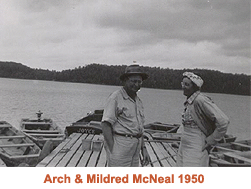 The first winter settled in and Uncle Arch and Aunt Mildred came down and stayed several months. During this time, we built John boats on the front porch of the lodge. We built a bunch of John boats. The screen on one end was carefully removed and the jig that Arch had built was passed through the opening and the ever present DeWalt radial arm saw was also placed nearby. The material was also passed in through that opening and Birdsong Boat Yard was in full swing. Once the design that we wished to use was perfected, we got to the point that we were turning out a boat in under two days. The boat was usually ready for pushing out of the “shop” by the afternoon of the second day. Painting would come later. I got to be very proficient with a calking mallet.
The first winter settled in and Uncle Arch and Aunt Mildred came down and stayed several months. During this time, we built John boats on the front porch of the lodge. We built a bunch of John boats. The screen on one end was carefully removed and the jig that Arch had built was passed through the opening and the ever present DeWalt radial arm saw was also placed nearby. The material was also passed in through that opening and Birdsong Boat Yard was in full swing. Once the design that we wished to use was perfected, we got to the point that we were turning out a boat in under two days. The boat was usually ready for pushing out of the “shop” by the afternoon of the second day. Painting would come later. I got to be very proficient with a calking mallet.
The Mississippi flooded late in the winter and TVA began to hold back water in Kentucky Lake to lessen the flooding. The lake begin to rise and we watched in wonder as Birdsong creek got wider and wider. At the highest point, water was only about 100 feet from the lodge. There were a number of boats that were anchored out and they picked up their anchors and drifted off to find new places to rest. Several of the boats that were located around the shoreline joined the migration when they either broke their mooring lines or pulled the bushes loose to which they were tied. Some broke off pretty good sized limbs or roots and cruised away with them. While this was going on, the boat building continued and the stack of boats waiting to be painted was growing. When we would push a finished boat out, it received a coat of preservative and a promise of something better to come. Elizabeth Carroll did much of the painting as soon as the weather began to warm up in the spring. In addition, she freehand painted numbers on each boat and gave them a name such as Lucky 13, Jitterbug, Troller, Hulla Popper, etc.
The water finally began to recede and along with all of the other things that were out of position, the dock was way up the hill. Each day, we would have to push it further back toward its usual site until finally, we had it back to where it should be. Dad and Arch took a boat and Aunt Mildred and I took a second and started on a boat roundup. Three and four at a time we herded them back to their accustomed locations. Only one gave us trouble and that because its anchor had fouled in something on the bottom. We could not get it to break loose and I suspect that to this day, that motor block anchor is still on the bottom of Birdsong creek.
We started the second season with 31 boats of assorted gender and 11 motors, also of assorted parentage. Dad had lost quite a bit of weight and stated that he was sure he could find it all between the lodge and the dock. The only quite time was the middle of the night, and one could not count on that as a sure thing.
 The second season saw more construction but not at the “frantic” pace as the first. There were not so many workmen involved in the projects. More cabins were brought on line and outfitted. Keep in mind that the atmosphere of the time was “fishing camp” and not resort. The furnishings of the cabins was military surplus bunk beds (the war was not long over). Lighting was Coleman lanterns in most cases and cooking in the cabins was done on kerosene stoves. The porches were screened to aid in mosquito control and several of the cabins had something of a view of the lake. By July of the summer of 1950, we had seven cabins. Two of them were “double” sleeping eight. Four were “single” and slept four. One slept two and did not have any cooking facilities. In addition, there were four sleeping rooms above the main dining room in the lodge. Each of these slept two. At this point, we had sleeping accommodations for over forty with none having to sleep on the floor.
The second season saw more construction but not at the “frantic” pace as the first. There were not so many workmen involved in the projects. More cabins were brought on line and outfitted. Keep in mind that the atmosphere of the time was “fishing camp” and not resort. The furnishings of the cabins was military surplus bunk beds (the war was not long over). Lighting was Coleman lanterns in most cases and cooking in the cabins was done on kerosene stoves. The porches were screened to aid in mosquito control and several of the cabins had something of a view of the lake. By July of the summer of 1950, we had seven cabins. Two of them were “double” sleeping eight. Four were “single” and slept four. One slept two and did not have any cooking facilities. In addition, there were four sleeping rooms above the main dining room in the lodge. Each of these slept two. At this point, we had sleeping accommodations for over forty with none having to sleep on the floor.
Though there were plans and funding for a boat ramp and a greatly enlarged dock on concrete floats along with other improvements, the status at this time turned out to be the final major construction projects for our family.
The second season saw a tremendous increase in customer traffic both at the dock and in the cabin rental business. We were running at full capacity on the holiday weekends and the traffic at the dock was heavier than ever. The dock itself was only a year or so old and there were times that the boats were gunnel to gunnel and we were starting to need more space. Often we would have boats that were active (rented) pulled into the bank because there was not enough room at the dock. In spite of this, the customers did not seem to mind. They came to fish and would not allow anything to get in their way.
Gasoline was much in demand so it became obvious that a barrel or so at a time was not going to cut it. Dad contacted the “City Services” distributor in Camden and he brought out a 500 gallon tank and a hand “rocker” pump of the old style. This pumped the gasoline into a large, calibrated, glass container at the top of the pump. One then dispensed the fuel into the empty container that had the correct amount of oil added fro the 2-cycle outboards of the time. This tank had to be located above the number 6 contour line so there was still the problem of a somewhat remote location from the dock. Still, this was a tremendous improvement over loading several barrels onto a utility trailer, driving into Camden, filling them and hauling them back.
Verne Menzies was cooking at the Lodge all the time now and what fabulous meals she could turn out! There was a short order menu that was available all the time from about 10 AM. For the evening meal, there was usually catfish with hush-puppies. We normally drove to one of the local commercial fishermen’s boat landing and bought directly from the boat so that the catch was definitely fresh. Verne would also cook someone’s catch to their order. Always, there was her barbeque and it was delicious. We had all of the soft drinks that were popular at the time on ice (literally) and the ice was brought twice each week from the ice house in Camden in the trunk of our car, three hundred pounds at a time.
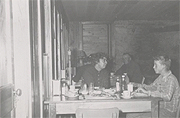 Marguerite & Jimmy at dinner in the lodge. Smith is seated at another table with a guest and is visible in the background.
Marguerite & Jimmy at dinner in the lodge. Smith is seated at another table with a guest and is visible in the background.
This was a great summer and the fishing was very productive. In addition, the lake got very warm and pleasant for swimming. At that time, many folks from Camden and the area around would come out on a Sunday afternoon and swim. The favorite location was across the lake at the north end of the levee. There was parking and an easy walkway down to the water. Often there was a group of 70 to 100 people there for several hours. I found that very inviting and would boat over and join them for a couple of hours. I met some folks there that would become high school classmates next year. Frequently, some of these folks would come into the lodge after their swim and have dinner with us.
All good things come to an end and so it was with that summer. The fall fishing season was excellent and we had a very reasonable occupancy through September and there were some quail hunters that were there in October and a few duck hunters as well but later in the season. However, winter became very cold. In addition, in order to supplement the income, Dad contacted a colleague in the funeral business who had an establishment in Benton, KY and took a temporary position for the winter. He was this point still accepting no wages from Birdsong so the extra income was most welcome during those winter months.
In January, the temperature began to drop dramatically. It snowed quite hard one night and left us with an accumulation of about 10 inches or so. The tough part was the low temperatures. It became obvious that we could not keep the pipes from freezing so I got some advice from the Baker brothers and they came down and helped drain the water system and blow out the pipes with compressed air so that there would be no damage from the sub-freezing temperatures. I could haul water by the bucket from the well house. We also pulled all of the boats out of the water and turned them upside down on blocks well away from the lake. The motor house was pulled up the hill on its skids, out of the reach of any possible high water in case the lake was raised.
Fortunately, we had many cords of firewood and plenty of food. Mom and I closed off all of the rooms except the one in which we were sleeping. It had a drum stove in it so we were able to keep quite comfortable and Mom used that for cooking. It was bitter cold. Since we were the only ones on the property at the time, we did quite well. I would load up the stove at bedtime and damp it down so it would hold almost all night. Usually around 3 AM or 4 AM, I would get up and add some firewood to make sure it did not go out. Dad was very concerned for us and drove in as soon as he could but the fact is, we did very well, all things considered.
School was closed, as one would expect, and there was three or four weeks when little moved. I would occasionally bundle up and boat to a small grocery store that was located across the lake from us. That would take about 15 minutes each way and that was plenty of time in the open boat to get really cold. I would join several others around the big Warm Morning pot bellied stove while Joe, the owner of the store, filled the order list that Mom had sent. Since we had a large supply of staples, there was only small amounts for me to carry home. After I had warmed myself and enjoyed an RC Cola and a Moon Pie, I would start back home.
The temperatures hovered around zero and finally, Birdsong Creek gave up its resistance to the idea and froze over. As far as the eye could see, it was one big block of ice. I was told by some locals that it was frozen as far as Ella’s Island. I shall never forget that sight. Some of the braver sorts walked across from the far side but I never had nerve enough to try that. I did walk around on the ice some distance from the dock but only after I had sat on the edge and stomped as hard as I could. As I recall, it was well over a foot thick.
It was many weeks before the water thawed and longer still before the ice was completely gone. School, which was a one room affair located at Mt. Moriah, finally reopened but we had to make up several weeks in the spring. Bummer! There was damage to several of the barrels that were used to float the dock but enough of them were intact so that we did not have trouble operating until the water was warm enough to make repairs. That water stayed cold for a good long time and we had to wait several extra weeks before swimming season got started that year. The fishing was outstanding that spring and summer however, and we suffered no damage in form of frozen pipes and the like. All in all, we got off quite easily, thanks to the Baker brothers help in winterizing.
It seemed like a very long time and an a lot of double solitaire later but spring finally began to try to melt the last of the snow and ice. At its first appearance, we began to get ready for the fishers. Hardly a mail delivery was made without reservations (still no phone) arriving. Everything was in order for the best season yet. The crappie were running and most everyone who tried their luck was rewarded with limit catches. In those days, the individual limit was 1 crappie and 7 bass per day. Folks would bring in their catch and dress them out (or have me dress them) and then we would place them in the big 21 cubic foot deep freeze. A solidly frozen catch would make it home, and these folks could enjoy Birdsong fish for months.
School was finally out and I was able to spend lots of time around the dock, my favorite place. As usual, the morning would often begin well before daylight with a tap on the window of my room, but usually I would awaken when a car approached along the drive way.
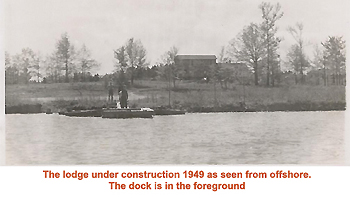
Chapter Five
Those That Came
I want to recall here some of the names of the wonderful friends who came to Birdsong to visit and fish. In one way, I am hesitant to start a list because there is no way that I will be able to recall everyone. If I did list everyone, I would run out of space. Here are some that come to mind.
Robert & Francis Brown……………………………..Nashville
Cecil Staples……………………………………Louisville
Dusty & Lillian Rhodes……………………………..Louisville
Brents & Ella Mathis………………………………Nashville
Francis & Glenn Bush………………………………..Huntington
Luke Welch………………………………………..Huntington
Major Knotgrass………………………………….Ft. Campbell
Lloyd Jones……………………………………..Harrodsburg
Perry & Anne Laura Meyers…………………………Louisville
Jerry Meyers……………………………………LaGrange
Russell Banta………………………………….Louisville
Martha Banta (Russell’s daughter)………………..Louisville
Larry Evans…………………………………..Louisville
Reed Howard…………………………………Louisville
Arthur & Lillian Branford…………………….Louisville
Dr. Marion Harlow………………………….Louisville
Ben Corbin……………………………….Louisville
John C. Thomas…………………………….Owenton
Elzie & Edna Keightley…………………….Hopkinsville
Luther & Mable Osborne……………………..Springfield
Bob & Hazel Caldwell……………………….Camden
Granville Vaughan………………………….Jackson
Ed & Joyce Pomeroy…………………………Nashville
Johnny Holmes…………………………….Nashville
Dr. Ralph Keightley……………………….Charleston
Arch & Mildred McNeal………………………New Castle
Charlie & Bobbie Elbrick…………………….LaGrange
Forrest & Pat Nelson…………………………LaGrange
Howard & Maude Hancock………………………Cave City
Roberta Moon……………………………..Springfield
Estil & Pat Thomas………………………..Pleasureville
Elzie & Edna Keightley……………………Hopkinsville
Logan Tandy……………………………..Louisville
Luther & Mable Osborne……………………Russelville
Harold & Roberta Moon……………………Russelville
Eldred Travis………………………….Camden
Ernie Styles…………………………..Louisville
Robert Barker………………………….Camden
Pascal & Thelma Coates…………………Marion
 There are so many others that I am not recalling at this time and that is both frustrating and embarrassing. I will add names as they occur to me. In addition to these folks, there were large groups that began to make several trips each year from Gailsberg, IN. Some of these folks worked for Gail Products and we bought several outboards through them. There was a group from Memphis that began to come about once per month. There was a family from Cincinnati…. A family fro Indianapolis…. a group fro Blythville…. there were dozens of others that should be mentioned but again, the memory is fuzzy after fifty years. Thanks to all who came and enjoyed Birdsong these early years. You contributed to a “break even” first season and a second season that showed a small amount toward debt reduction although Mom and Dad were not taking any salary from the corporation. Still in all, a very remarkable situation considering that it usually takes many years for such a business to start to make something of a return on investment.
There are so many others that I am not recalling at this time and that is both frustrating and embarrassing. I will add names as they occur to me. In addition to these folks, there were large groups that began to make several trips each year from Gailsberg, IN. Some of these folks worked for Gail Products and we bought several outboards through them. There was a group from Memphis that began to come about once per month. There was a family from Cincinnati…. A family fro Indianapolis…. a group fro Blythville…. there were dozens of others that should be mentioned but again, the memory is fuzzy after fifty years. Thanks to all who came and enjoyed Birdsong these early years. You contributed to a “break even” first season and a second season that showed a small amount toward debt reduction although Mom and Dad were not taking any salary from the corporation. Still in all, a very remarkable situation considering that it usually takes many years for such a business to start to make something of a return on investment.
Chapter Six
Memorable Events
Of course, Birdsong was a wonderland of places to explore for a thirteen year old with access to a boat and outboard motor. I spent hours looking into every bay and creek that the thirty plus miles of shoreline offered. I explored from above Little Birdsong Creek to the mouth of Birdsong at the junction with the Tennessee River. Downstream past New Johnsonville and upstream beyond Eagle Creek. The dozens of side bays and streams became my jurisdiction.
Camp Mac Morris, a Boy Scout camp located on nearby Badger Creek did not escape my attention and as soon as I noticed activity there I made contact with the folks that ran the place. Since I was already a scout, I was able to get myself a volunteer position as a canoe instructor. This is something that I was able to do during the midday, allowing time for the usual things that I took care of in the early mornings. I would take a boat and go to the waterfront at the camp around 10 AM and teach for about 2 hours and then home for lunch and usually a nap.
One afternoon, the lead waterfront counselor, Jim Miller and I decided that we would offer the campers some training hours in stealth canoeing. We worked to improve out paddling with out making a sound. We practiced without speaking a work and worked on keeping the paddles in the water at all times so there was not even the dripping of water on the forward reach.
After several trips for practice, were putting the final touches on our techniques. As we glided along the levee in complete silence. Jim (in the back) flicked a few drops of water on me to attract my attention. I turned so I could see him and he pointed to the bank some 30 or 40 feet away. I looked in the indicated direction and there was three very lovely ladies sunbathing in their very nicely tailored birthday suits. Of course, we were the gentlemen and did not wish to alarm them by making a sound. However, I forgot to give that message to my vocal chords and before I could gain control, a tiny sound escaped. As I recall, it was something like AAAAAAAAAHHHHHHHHHHI I I I I I I I I I I I I I.
Now there is just no accounting for some people. Those three ladies as one lifted their heads and looked at us fellows in the canoe and they let out the most bloodcurdling screams I had ever heard. At that moment, my vocal chords again escaped control and began babbling incoherently and it was several moments before I noticed this violation of protocol. After a brief struggle, I was able to restore control. Again, as one, the girls bolted for the brush. Unfortunately, it was very near at hand. Almost instantly, there was no one left on the bank. Miller reacted to my discomfiture in a very soothing way by bending forward and laughing hysterically while gesturing in my direction. I felt that was a totally unfair thing for him to do and I was offended. It took a few days but I did forgive him (on his seventieth birthday) for this undeserved outbreak at my expense. As we began to paddle away, a female voice yelled “I know who you are Jimmy Keightley and I am going to tell your Dad.” At first, I was concerned by this but soon realized that in those days, they were more in violation of the standards of behavior than I. Further, Dad would get a real laugh about the matter. In any event, I never heard anything further from them. Of course, Miller found it necessary to share the moment at the counter of the lodge so that all in Benton county could know of my reaction. I am told that my red face was visible through my heavy suntan. Today, I can’t recall for sure who they were but two names do come to mind. Maybe I can discuss the matter with them at the next high school reunion. Perhaps someone else will be blushing.
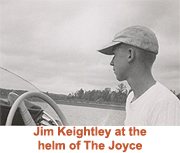 I had access to a Chris Craft inboard runabout and on occasion in the evenings, some of the counselors at Camp Mac Morris would canoe over to our dock. We would load into the speedboat and head toward the river and then downstream. At a certain channel marker, we would make a left turn and follow a particular channel to a girl scout camp. In the glow of their walkway and dock lights, we could see the counselors from that facility coming to greet us. We would spend hours discussing strategies for leading young campers and planning activities that would train them for the life that they would soon be growing into. All involve agreed that these trips were well worth the effort because of the insights we gained. I have always been somewhat offended by my wife’s reaction to this story due tot he skeptical tone when she says “Right….. insight. Sure…. strategy.”
I had access to a Chris Craft inboard runabout and on occasion in the evenings, some of the counselors at Camp Mac Morris would canoe over to our dock. We would load into the speedboat and head toward the river and then downstream. At a certain channel marker, we would make a left turn and follow a particular channel to a girl scout camp. In the glow of their walkway and dock lights, we could see the counselors from that facility coming to greet us. We would spend hours discussing strategies for leading young campers and planning activities that would train them for the life that they would soon be growing into. All involve agreed that these trips were well worth the effort because of the insights we gained. I have always been somewhat offended by my wife’s reaction to this story due tot he skeptical tone when she says “Right….. insight. Sure…. strategy.”
 We could always tell when a storm was about to hit us. Storm clouds always came over a particular hill. Whenever we saw one coming from that direction, it was time to head for the dock and get off the water. There was always wind involved and, much more dangerous, lightning. Almost always, some boats would break their mooring lines and head off down the lake on their own. We did not get too excited by their departure because they could not get out of Birdsong and into the main lake and we would be able to locate them after things settled down. I remember sitting on the front porch drinking an RC Cola and munching one of Verne’s barbeque sandwiches watching the drifting boats and making a note of where they went.
We could always tell when a storm was about to hit us. Storm clouds always came over a particular hill. Whenever we saw one coming from that direction, it was time to head for the dock and get off the water. There was always wind involved and, much more dangerous, lightning. Almost always, some boats would break their mooring lines and head off down the lake on their own. We did not get too excited by their departure because they could not get out of Birdsong and into the main lake and we would be able to locate them after things settled down. I remember sitting on the front porch drinking an RC Cola and munching one of Verne’s barbeque sandwiches watching the drifting boats and making a note of where they went.
Fortunately, these storms seldom lasted long and after things settled down, I would pick out a John boat with a nice, square bow and head off in the direction that the boats had headed. I would take along several lengths of rope. One at a time, I would tow the wandering boats into deep water. When I had them rounded up, I would raft them together like barges. I would then position my John boat behind and start them back by pushing them ahead much like you see barges doing on the inland rivers today. I usually used a particular outboard that had the ability of 360o steering, state of the art at the time as none yet had reverse gears. Sometimes, I had six or more boats in tow, 3 wide and 2 ranks.
I got really deft at sculling a boat. This is done using a short paddle and only one arm/hand. By angling the paddle in a certain way, one can keep the boat as desired for bait casting without paddling on first one side and then the other. (No electric motors then) This helped me pick up some duties as a guide from time to time. More often than not, this seemed to involve my Dad and Uncle Arch. The three of us would head off to a favorite fishing location. I would sit in the bow and scull while the three of us would cast for bass.
Now three bass casters in a 12 or 14 foot boat requires some finesse. Since none of had ever heard of finesse, we didn’t have any. Things usually went pretty well but it was a good thing to wear as hat with flaps down past the ears. A helmet would have even been better. All in all, the conversation was usually light and friendly and the normal banter was the fare of the day. “Why are you tangled in that bush?” “Over the tree limb again eh? You must have quit fishing and gone to squirrel hunting. Heh Heh” “Arch, dammit, that is my hat you just cast there.” “Interesting bird nest configuration you have on your reel there.” The usual helpful comments well calculated to assure that the recipient was subjected to adequate humiliation and alert to any opportunity for retaliation. These trips were occasionally known to produce fish.
I never cared much for snakes. On the one hand, I only saw one cottonmouth and one rattlesnake the entire time that I lived at Birdsong. On the other hand, there were way too many of what had been identified to me as “Tennessee river snakes.” I do not know if that is the correct name and for this discussion, it makes little difference. In any event, these snakes were very fond of fish. Since they appeared to mean the fisherman no harm, they seemed to be totally fearless. I have had them attempt to get over the side and into the boat apparently in an attempt to get at the catch or to the minnows that we used for bait in those days. The knowledge that they were not poisonous was of little interest to me at the instant. A paddle was the usual weapon of choice to fend off these pesky critters. I seem to recall that it was helpful to yell obscenities while flailing away. The snake always seemed to look surprised that someone would be upset with its intention to take dinner from a creel. Several times, I have looked over the side of the boat to find one of the critters circling my stringer.
I recall one time when a regular visitor returned to the dock much earlier than usual for him. It seems that one of these snakes had actually gotten into the boat with him. It appears that he had no more like for snakes than I so he outs with his snub nose .38 special and dispatched the critter. There was, however, a bit of overkill with the weapon and the bullet having done its work on the snake head, proceeded to seek other environs by exiting the boat via the bottom. When the boat arrived at the dock, he was sitting with his feet in several inches of water. Dad recommended that he use a paddle for a weapon on future encounters.
 The picture is of J.D. Baker holding the remains of one of these snakes. In the picture, he is holding the snake out at arm’s length. As you can see, the head is at eye level and the tail is still on the ground. J.D. was over 6’2″ tall.
The picture is of J.D. Baker holding the remains of one of these snakes. In the picture, he is holding the snake out at arm’s length. As you can see, the head is at eye level and the tail is still on the ground. J.D. was over 6’2″ tall.
The time that I encountered a rattlesnake, I was at Camp Mac Morris walking along a trail behind Jim Miller. He was pointing out different flora and fauna as we walked along…. Wild fern he would say. Black berry….. Pine tree….. Racoon…… Snake…… I had pretty much lost interest and was thinking about other things when that last one registered. I looked down just in time to see my right foot coming down toward a fairly large rattlesnake. I was immediately able to redirect this foot along with its mate and avoid stepping on the snake. I was gifted in those days with great dexterity and was able to avoid the obstacle in my path named Miller while leaving only one footprint in the middle of his back. The next few moments alone were enough to qualify me for the merit badge in levitation.
I loved to swim in Kentucky Lake and did so every summer day and usually several times each day. The uniform of the day in summer was swimming trunks the entire summer long. I would get as dark as could be and my hair would bleach out in the sun to white. With what we now know about such sun tans, I would do things very differently but in those days, we were ignorant and happy. I would start my day as I have outlined elsewhere and after my midmorning nap, I was in the water either at the dock or at Camp Mac Morris. On this particular morning, I jumped into the water right off the end of the dock and practiced entering the water without going under. This technique is used when going in to rescue another swimmer in distress. One can keep their eye on the other person. I swam several yards out and at that moment about 5 feet away from me, one of those big river snakes surfaced. In retrospect, he seemed about as startled as I. Now earlier, I mentioned that I did not care for snakes and situations like this served to reinforce my dislike for them. I was not sure how I was going to get back to the dock but if memory serves, it was this incident that qualified me for the merit badge in water walking.
There were also some very large turtles in and around the lake. One Sunday while swimming at the end of the levee with the folks from Camden, I bumped into an object on the bottom. I felt with my foot and someone had placed a very large rock there for diving. I stepped up onto it and was now out of the water from the waist up. As I spoke to my companions about this find, “the rock” began to walk away with me aboard. I knew instantly what was going on and made a remarkably long dive toward the opposite direction that this turtle was going. I was remembering what I once saw one of these critters do to a one inch stick that had been extended in its direction. It struck and snapped the stick like it was made of butter. I related this to my toe and this gave some real impetus to my dive.
 Occasionally in the winter duck hunting season, I would get invited to go along on an expedition. I remember one such occasion when a local offered me such an opportunity. All I had to do was furnish breakfast, gas, boat and some ammunition for my companions 10 gauge magnum anti-aircraft double barreled shotgun. I am sure that he would prefer to remain unnamed. Mom got up and fixed us a fine breakfast and we were away from the dock well before daylight in a Reel Foot Lake boat. The weather was cold with snow mixed with rain and sleet. Perfect for duck hunting. Our route took us through a game preserve. As we putt putted along through the preserve, a hapless flock of ducks flew over head in the pre-dawn gloom. My companion ups with that non-wheeled canon and lets fly. There is a blinding flash from the muzzle with blue and yellow flame extending outward for about 3 feet. This was instantly followed by another explosion from the other barrel. He knocked down six ducks. Four were stone dead and two were floundering around. I began to circle around with the boat while we gathered up his kill. This all occurred before legal shooting light, in a game preserve and from a motorboat while underway, not to mention he had taken more than his limit. I turned that boat toward home. When we got back to the dock, I headed straight to the lodge and something hot to drink. After visiting at the counter over coffee for a while, he asked if I would like to fire his shotgun. I got dared so we headed outside so that I could experience the “ultimate shotgun.” He recommended that I fire a certain barrel first and I tried that. I know now that I was set up. It seems that when that trigger is squeezed, it drags the other trigger along with it, discharging both barrels. Overall, it was not too bad an experience. After my vision cleared and my head stopped ringing, I decided that I was not cut out for anything quite that heavy unless it was attached to the deck of a Navy ship. For several months, I was the only fellow in the area that could clap my shoulder blades. I have not been duck hunting since that day, nor have I had much to say to my hunting companion.
Occasionally in the winter duck hunting season, I would get invited to go along on an expedition. I remember one such occasion when a local offered me such an opportunity. All I had to do was furnish breakfast, gas, boat and some ammunition for my companions 10 gauge magnum anti-aircraft double barreled shotgun. I am sure that he would prefer to remain unnamed. Mom got up and fixed us a fine breakfast and we were away from the dock well before daylight in a Reel Foot Lake boat. The weather was cold with snow mixed with rain and sleet. Perfect for duck hunting. Our route took us through a game preserve. As we putt putted along through the preserve, a hapless flock of ducks flew over head in the pre-dawn gloom. My companion ups with that non-wheeled canon and lets fly. There is a blinding flash from the muzzle with blue and yellow flame extending outward for about 3 feet. This was instantly followed by another explosion from the other barrel. He knocked down six ducks. Four were stone dead and two were floundering around. I began to circle around with the boat while we gathered up his kill. This all occurred before legal shooting light, in a game preserve and from a motorboat while underway, not to mention he had taken more than his limit. I turned that boat toward home. When we got back to the dock, I headed straight to the lodge and something hot to drink. After visiting at the counter over coffee for a while, he asked if I would like to fire his shotgun. I got dared so we headed outside so that I could experience the “ultimate shotgun.” He recommended that I fire a certain barrel first and I tried that. I know now that I was set up. It seems that when that trigger is squeezed, it drags the other trigger along with it, discharging both barrels. Overall, it was not too bad an experience. After my vision cleared and my head stopped ringing, I decided that I was not cut out for anything quite that heavy unless it was attached to the deck of a Navy ship. For several months, I was the only fellow in the area that could clap my shoulder blades. I have not been duck hunting since that day, nor have I had much to say to my hunting companion.
Sometimes I wonder how I lived to be writing about some of the events that occurred on Kentucky Lake. In this case, I wonder how my long time friend Joe Pidgeon survived. We had been out for a boat ride . Since both of us had work/school obligations, we had to boat when we had the opportunity. At this particular time, Joe and I were partners in a 10 HP Mercury Cruiser outboard that made that one and only Mercury sound when it wound out and brought a boat up onto the “step.” Since it had gotten dark on us, we had positioned the boat in line with the light on the dock in the hope that two buoys that we must pass would be visible in said light streak on the water. W R O N G !!! The buoys were just inches to the side of the light and we hit the first one a heavy though glancing blow. Joe leaned over the side to see if there was any damage. At that instant, the second buoy following the example of the first was hit, missing Joe’s head by what must have been less than two inches. We both had very white faces in the gloom.
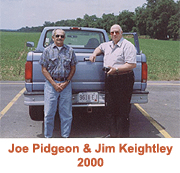 One sunny afternoon during the slow time, some of my school chums had come to visit. We were lying in the grass near the dock chatting and making dares and boy stuff like that. Suddenly, across the lake came the sound of a heavy explosion. Black smoke rose above the tree line. I guffawed “Ole Bill (not the correct name of course) must have blown his still. HAR HAR HAR.” Everyone looked at me like I had committed a really big social blunder. One of the boys (Ole Bill’s son) turned white and just at that instant remembered that he had urgent business at home and took off running. We found out a few days later that my little joke wasn’t too funny after all. Ole Bill was in the hospital at Nashville with serious burns and impaired hearing.
One sunny afternoon during the slow time, some of my school chums had come to visit. We were lying in the grass near the dock chatting and making dares and boy stuff like that. Suddenly, across the lake came the sound of a heavy explosion. Black smoke rose above the tree line. I guffawed “Ole Bill (not the correct name of course) must have blown his still. HAR HAR HAR.” Everyone looked at me like I had committed a really big social blunder. One of the boys (Ole Bill’s son) turned white and just at that instant remembered that he had urgent business at home and took off running. We found out a few days later that my little joke wasn’t too funny after all. Ole Bill was in the hospital at Nashville with serious burns and impaired hearing.
Two of the best friends that we had were Bob and Hazel Caldwell. Herb had been a mason before retirement. They bought a piece of property in Mt. Moriah and he built a native stone house. It is still there at the time of this writing. They also operated Caldwell’s Cash Market but that building is gone. They kept a 14 foot John boat in the little cove near the dock and would come down two to four times each week for an afternoon of fishing. One afternoon after a rain, they showed up and I walked over to help with their motor. It was a Hiawatha built by Gale Products. After I had it mounted and fueled, I started to bail some of the rain water out. Bob said that he would take care of that after they were underway as all of the water would run back to him for easy bailing. Hazel was a bit stove up with arthritis and moved slowly and deliberately. She entered the boat, turned around in her usual fashion and began backing in a crouch toward the center seat. She did not check her location and when she sat, she missed the seat by several inches and sat clear to the floor in the water. Bob laughed but Hazel didn’t, and neither did I. At least until they were out of earshot.
Earlier, I mentioned that we would drive to one of the commercial fishermen’s landing and buy fish to serve in the lodge. On one such occasion, Mom and I made a fish buying trip to get small catfish (called fiddler cat’s). Every cabin was full so Verne said to get at least 3 dozen. Mom and I selected the fish, most of which were still alive and laid them on newspapers in the trunk. We then folded more newspapers over and around them and headed back. About a week later, the car developed a very odious personality and it lingered for weeks. We looked high and low for the source of this problem bur were unable to locate the source. We drove with the windows rolled down!
One day, I made the morning run to Camden with Mom to get a few kitchen supplies and whatever hardware that Dad had need of. On the way back, we had a flat. I got the car jacked up and the flat off. When I pulled the spare out of the trunk, we found the source of the smell. One of the catfish had flopped around and fallen into the wheel well and wiggled under the spare tire. Some of its mushy remains were still there and had attracted the attention of many, many maggots. I thought Mom was going to lose her breakfast right then and there!
The dock was built to float upon oil barrels. There were no concrete floats available to us at that time and certainly no such thing as Styrofoam. Each year, some of these barrels had to be replaced because of rust through. We would wait until the water was at a tolerable temperature. Two of us would swim under the dock and do whatever we needed to cause the existing partly filled barrel to sink after we had tied ropes around its middle. These were then pulled out from under the dock and close to the surface. An air compressor was used to force the water out so that it could be hauled out of the lake. We would then place 2 X 6’s on the underside of the dock. A leverage device that we had built out of 2 X 4’s was moved into position with one end under the edge of the dock and the new barrel ready to go under. Two more workers would get on the jack and walk toward the far end of its handle and the barrel would be forced down into the water and under the edge of the dock. The barrel was pulled further under the dock by ropes from the opposite side of the dock until it was in proper position. It would then slam into the underside of the dock planking adding its buoyancy. The two that had walked out on the jack handle were now also swimmers. We all made our way to the dock for a rest before repeating the process again and again until all barrels had been replaced as needed. Usually, there were three or four that needed our attention. We never had anyone injured in this process and we never considered that a possibility. However, there was a lot of leverage and force brought into play and I now realize that there was a real potential for danger.
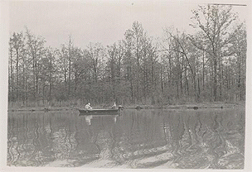 I recall one summer when the crappie season was pretty much finished until the water was cooler. A friend came down from Galesburg, Indiana and asked me to take him fishing. I knew that there were just no fish in the usual beds and was at a loss as to where we could enjoy some reasonable chance of catching at least a few. We tried a several places and were about to give up and head in for lunch. For some reason, I stopped at the bridge and tied up on the channel side of one of the pilings. We rigged fairly deep using minnows for bait. Our rigs had scarcely reached the set depth when we began to get bites and landed one after another crappie about 10 inches long. It was no more than 2 hours until we had our limits. When we reached the dock, Dad was waiting to greet us with camera in hand. I asked how he knew that we had enjoyed good luck. He said that he had been listening to us laugh for the last couple of hours.
I recall one summer when the crappie season was pretty much finished until the water was cooler. A friend came down from Galesburg, Indiana and asked me to take him fishing. I knew that there were just no fish in the usual beds and was at a loss as to where we could enjoy some reasonable chance of catching at least a few. We tried a several places and were about to give up and head in for lunch. For some reason, I stopped at the bridge and tied up on the channel side of one of the pilings. We rigged fairly deep using minnows for bait. Our rigs had scarcely reached the set depth when we began to get bites and landed one after another crappie about 10 inches long. It was no more than 2 hours until we had our limits. When we reached the dock, Dad was waiting to greet us with camera in hand. I asked how he knew that we had enjoyed good luck. He said that he had been listening to us laugh for the last couple of hours.
 One summer afternoon, a fellow brought a very old outboard that he had obtained from who knows where. He rented a boat and attached this antique. After asking advice on everything from fueling to how to wind the start rope, he pushed off and began to crank. After a while he paddled back to the dock and asked for more advice. I told him that he was going to have to place the spark lever about 3/4 way over to get the timing advanced enough for the engine to catch. He tried it and it started with the next pull. He immediately flipped the lever back to the stop position, pushed off again and since he didn’t want such a surge on the start up, only advanced the spark lever a little. This time, the engine backfired and started running backwards. Since he was sitting facing backward and the engine had no hold down devices, it started to tilt itself up until it buried its two exposed spark plugs in his bare knees. When he finally got the thing stopped, he very casually unclamped the motor and lifted it clear of the transom and let it go over the stern of the boat with a splash. He paddled to the dock, got out of the boat, walked to his car and drove away, never to be seen again at Birdsong. I later grappled the motor off of the bottom. We cleaned it out and got it to run thinking that the guy would eventually come back to get it. However, it sat in the motor house for a couple of years and was still there when we moved. I have no idea of what ever became of it. The motor power head in the picture is not exactly the one but it is close. The spark plugs were tilted forward at about 45o
One summer afternoon, a fellow brought a very old outboard that he had obtained from who knows where. He rented a boat and attached this antique. After asking advice on everything from fueling to how to wind the start rope, he pushed off and began to crank. After a while he paddled back to the dock and asked for more advice. I told him that he was going to have to place the spark lever about 3/4 way over to get the timing advanced enough for the engine to catch. He tried it and it started with the next pull. He immediately flipped the lever back to the stop position, pushed off again and since he didn’t want such a surge on the start up, only advanced the spark lever a little. This time, the engine backfired and started running backwards. Since he was sitting facing backward and the engine had no hold down devices, it started to tilt itself up until it buried its two exposed spark plugs in his bare knees. When he finally got the thing stopped, he very casually unclamped the motor and lifted it clear of the transom and let it go over the stern of the boat with a splash. He paddled to the dock, got out of the boat, walked to his car and drove away, never to be seen again at Birdsong. I later grappled the motor off of the bottom. We cleaned it out and got it to run thinking that the guy would eventually come back to get it. However, it sat in the motor house for a couple of years and was still there when we moved. I have no idea of what ever became of it. The motor power head in the picture is not exactly the one but it is close. The spark plugs were tilted forward at about 45o
The second summer, the chamber of commerce from Camden approached us and was interested in organizing a boat race. Well, it sounded like a great idea so we went ahead with the plan. The event was scheduled for the middle of August. The C of C did all of the advertising and we set up a booth not far from the dock and vended hot dogs, pop, potato chips and the like. It went off pretty well. There were class A and B hydroplanes and utility boats and there were enough for several heats in each class. There was even one inboard utility and one inboard hydro that showed but there was no competition for them and they merely put on an exhibition. The owner/driver of the hydro asked me if I would like to take a ride with him. Of course, I jumped at the idea. He handed me a pair of goggles and a life preserver and I sat astraddle of his shoulders as there was certainly no room for me in the cockpit. He later told me that he figured we had reached a speed of over 85 MPH. That is easily the fastest that I ever rode in a boat and I have absolutely no desire to ride that fast again. It seemed to me that buoys a quarter mile apart were going by like the teeth in a picket fence.
The second summer also saw a gift to me from my family of a brand new 12 horse power Sea King outboard bought from Montgomery Ward. I anxiously awaited the delivery of this monster (for the time) motor. We finally got word that it was awaiting pick up at Railway Express in Camden. That morning, Dad took the daily trip into town and we stopped by the depot and loaded the motor in its box into the back seat. (The trunk had to kept available for the ice.) That afternoon, I started the break in time by boating around the area. Finally, I got the required hours on it and could open it up so that the boat came up on the step. What a thrill. I had that motor for several years until my friend Joe Pidgeon and I went partners on a Mercury Cruiser 10. That Sea King became the work horse around the dock. If there was a breakdown, it was the one that went to the rescue. Boats astray? The Sea King to the rescue. That motor and I were all over that area of Kentucky Lake.
One July afternoon the second season we were operating Birdsong, I was at the dock puttering around. I kept hearing an outboard but I could not locate it. Finally, I saw “something” coming very slowly around the point of Ella’s Island. It appeared at first to be a houseboat. It took a course that brought it down the far shore of the lake. I finally gave in to curiosity and fired up a boat and headed for a closer look. It turned out to be a small floathouse on barrels. There was a walk around the outside with a small building in the center. It was painted white with red trim, rather attractive by standards of the day. I circled my boat a bit closer and found that there was a sign leaned against one wall that indicated that this was going to be another boat dock and a competitor for us. This float house proceeded to a location at the end of the levy where it was tied up. I got underway for home and went directly to find Dad. He dismissed my alarm, assuring me that we had an exclusion on that stretch which prohibited such competition. I went on about my business to wait and see what would develop.
Two days later, I went with Dad to visit Joe Flowers who operated a small grocery across lake from us and he was also a licensed fishing and hunting guide. As we drove past the end of the levy where the new dock had been tied up, the sign that I had seen sitting on the deck was now posted on a tree. Dad slid to a stop, unable to believe his eyes. The visit to Joe Flowers was forgotten for the moment and we returned to home. Dad had a brief conference with members of the corporation that were present concerning this development. He then went into Camden (the nearest phone) and called our contacts at TVA who were located in Paris, TN. They were unaware of the situation and as alarmed as were we. They showed up at the float house the next morning, took some pictures and left. In just a few hours, they were back with documents that were served upon the premises. These papers ordered the removal within a time certain. At the last possible moment before seizure (the sheriff was on hand) the lines were loosened and outboard power was again applied and the float house again became a houseboat.
This time it went to Liz’s Cove and tied up to property that was actually a portion of our lease but this time, there was not business established and the floathouse became a private recreational retreat. Since there was no commercial venture involved, our corporation contacted them via our attorneys and gave them permission to be there for one year without charge and advised them that at the end of the year, they would have to vacate from our property or enter into a lease/rental agreement.
Some months later, there was a commotion at around 3:00 AM at thee door of the lodge. I heard Dad go to the door only to find the man who had operated the “dock” wishing to buy mixer. It seems he was planning a play day at the floathouse. In order to get this couple off the property as quickly as possible, Dad made the sale and they left. Around 10:00 AM, I noticed smoke coming from that direction. I ran to the lodge and let every one know what was going on. Sure enough, the float house was afire and by the time we arrived, it was fully involved and there was no hope of extinguishing it. The broom straw in our field was set off and that point of land was burned to the lake and the road but there were no structures in the area. Thus ended the short career of a rather cute float house. Turns out that an attorney from Camden had been the money behind the original scheme. Seems to me that a bit of beforehand investigation would have reveled that one cannot just go out and “squat” on TVA property.
One evening, a group of my friends were sitting near the dock swilling down the requisite R C Cola and munching Moon Pies. We noticed a car driving rather slowly across the levee. It stopped in the middle of the bridge. In a few moments, we heard a loud splash. The car door slammed and the car continued out of site only to return in a few minutes this time headed toward Camden. We thought at the time this was a bit out of the ordinary but there seemed little we could do.
A few days later, the sheriff and a deputy drove up and asked Dad if we could assist. He explained that there had been a burglary at Red’s Chevrolet and a cash register had been taken. The culprit had been apprehended and stated that he had thrown the register off the bridge. Dad asked me to take the Sea King and the grappling hook and see if we could recover. Since I had a pretty good idea where to look since I realized that we had been watching when it went over the rail, we caught it on the third pass.
Now no thinking person has ever said the bad guys are smart. This Einstein had pried open the drawer. It was a mechanical register and required only that one press no sale and the drawer would open. There was nothing at all in the cash register but there was an unlocked safe sitting on the floor a few feet away and IT WAS NOT LOCKED. Brainiac spent several years in the joint at Nashville for this flash of genius.
One hot August afternoon, the unmistakable sound of an inboard came to my ears. A few moments later, around the point of Ella’s Island came a beautiful red and white speedboat up on the step and running at about 40 MPH. It approached the dock and came to a stop. The operator identified himself as “Fish” O’gwinn and asked if the party could water ski from the dock. There was little going on fishing wise at the moment so we welcomed them. The boat turned out to be a 19 foot Higgins Sport Speedster built by Higgins Inc., New Orleans. It had a 185 HP Chrysler 8 with twin down draft carburetors. The boat had dual cockpits forward with the rest of the boat decked. It made a great ski boat. I got to ride with the folks for a couple of hours before they departed. They returned 2 or 3 times each week for the rest of the summer and again each summer that we were at Birdsong. Fish was, at that time, living in Waverley and as I recall, operated a restaurant or tavern. He became a pretty good acquaintance. He kept the boat, named “The Jinx” moored at Lucas Landing near the Hickman Lockhart bridge.
I can’t recall all of the why’s and wherefores of how this situation came about but I certainly remember the outcome very well. Someone had showed up at the dock and wanted to look around the Duck River Pumping Station area. This was located on the far side of the main channel and would require most of the day. I loaded lots of extra gas for the Sea King along with some snacks and drinks and the two of us started out. This outing turned into an adventure for sure. I recall that we had accomplished our recon mission and were heading back. In those days, there were no aids to navigation in the area we were in and I was not familiar with those waters. We were clipping along at a pretty good pace when we came in contact with a stump that refused to yield the right of way. Now I always carried several shear pins in my pocket along with the necessary tools to change them so I figured this would be only the work of a few minutes. The motor was tilted up and that is when we got the bad news. One of the blades of the propeller was missing. By now, it was supper time and we were many miles from home and the wind was making up. There was nothing else to do but put the motor back down, start up and idle our way back home. The trip that should have been done in less than an hour took us nearly four hours. Anything above an idle brought about violent vibration so was out of the question. The lake was low so there were no short cuts that could be taken, we had to “run the channel” all the way. We just had to sit there while the Sea King idled us home. By the time we got back, it was full dark and Dad was very worried for us as one would expect. He and a friend were on the dock with a very powerful spot light watching and picked us up about a half mile out. The replacement prop cost a bit over $10., a goodly sum in those days.
One of our regular visitors came from Jackson, TN nearly every week. As I recall, he was a newspaperman and may have even owned the paper there. He was very hard of hearing and wore one of the early versions of the hearing aid. The electronics deck was carried in a leather pouch in the center of the chest with a “bug” in the ear. He had a small Neptune outboard of less than 1 horsepower that he used to get around the lake with. It had no exhaust pipe to take the noise down into the water and simply vented right out of the cylinder. Man was that thing loud. I recall one day that he started up and was motoring away from the dock. He soon turned around and looked at the motor. With his right hand, he reached into his shirt and turned off the hearing aid then thumbed his nose at the motor. He called the thing “Ol’ Sputterfuss.”
One lovely summer day, a friend from Camden and I decided to explore the upper reaches of Birdsong Creek. We loaded up plenty of extra gas, along with some soft drinks and sandwiches and headed under the bridge. I always had to cast about to find the entrance to the creek. The entrance was not marked and the water was shallow. Often, it was necessary to get out and push off the mud. However, once in the channel, there were post marking the channel and it was easy going and very beautiful. I always enjoyed that trip. We motored along for a while watching the turtles drop off the logs as we approached. One particular side channel caught our attention so we idled down and turned in to see what we might find. We followed the twist and turns for maybe a half mile. Coming around a bend, we surprised to young persons using a seine. They were just as startled as we were. They let out a yelp, dropped the net and lit out for points unknown, leaving the net and most of their clothes behind. I never did find out who they were but we used the seine they left behind for several years to catch minnows for bait.
Mom discovered that she was feeding a small colony of mice. Now my Mom was pretty strict on cleanliness and this situation was not to be tolerated. She tried several different approaches to rid us and perhaps the entire civilized world of these pest. They seemed to find the efforts rather amusing and became more bold as time went by. One of our visitors was Larry Evans from Louisville. He was a principle in Kentucky Terminex. He wrote and made reservations and Mom immediately wrote back that he should come prepared to deal with the mice. When Larry arrived, he had scarcely stepped into the lodge when Mom confronted him. He was escorted to the kitchen and shown where the conniving critters were hanging out. Larry made the correct expressions of concern and the tour continued. Larry caught a moment when Mom was distracted, reached into his pocket and pulled out a packet of SinSin and sprinkled some of these little black breath mints at the back of the counter. Mom rejoined him and they continued their tour. Shortly, they returned to area of the kitchen that Larry had “salted.” He pointed out the little black items and said something to the effect that those might just be mouse turd’s. He wet his finger, press down on one and placed it is his mouth and exclaimed “Reite, you are right. These are from mice.” Mother was just short of hysterical and when she found out that she had been taken in, she failed to catch the humor of the joke.
There was a taxidermist in Camden that approached me with a money making proposition. He wished to mount two herons. One a Great Blue and one a Great White. He obtained the necessary permits (they were regulated and protected even then) and I was to bag these birds and bring them to him at once. I got my trusty .410 shotgun and went to a location that I knew to be frequented by these birds. I saw a Great Blue wading along a point so I went to the far side and landed the boat. I crouched down and crept through the broom straw until I felt I would be in position to wait for the bird to work his way to me. I waited….. And waited…… Keeping my self out of sight. Finally, I readied the shotgun and stood up. The bird was just where I thought it would be. It was startled into flight and flew gracefully from my right to left at just the right distance for a perfect wing shot. I took an extra second or so to get the lead angle perfect and squeezed off my shot. BOOOOMMMM….. the shot could be easily heard striking the bird. SPLAT…. The heron casually looked over at me and never missed a wingbeat. It continued its leisurely flight pattern undisturbed and unaltered. That shotgun hardly mussed a feather of that bird. I never have been able to figure out why those birds were protected. They don’t need protection.
There was a company that operated a dredge along the main channel of the river not far from the entrance to Birdsong Creek. They produced sand and grave using the suction method. The material was transported fairly high on the dredge and washed down onto a screen to filter out the gravel. That was sent by conveyor belt to on barge and the water with the sand was diverted into another barge. The barges were pushed to the steam plant that was under construction at New Johnsonville. I enjoyed boating out to that operation and hitching a ride on the towboat’s. They operated two of them, the Joe Belk and the Blanche. I still have a picture that I took from the wheel house of the Joe Belk. The deck hand would help me pull my boat up onto the deck of the towboat and I would make a round trip to New Johnsonville with them. They treated me royally and I even got to stand a helm watch from time to time. It was great sport.
Chapter Seven
Disaster Strikes Our Family
Uncle Elzie and Aunt Edna had come down from Hopkinsville to spend a day or two. They arrived May 8th, 1951. Aunt Edna was interested in having a certain type of wildflower in her yard. The next morning, Mom got in our car and was going to a location that had some of this type flower. As she rounded a turn, she was forced off the highway and the car went over an embankment that was about eight feet high. The car rolled and she was ejected.
A good Samaritan came by moments later and freed her from the overturned vehicle. As I understand it, she was somewhat trapped and the car had crushed her fairly severely. He placed her in his car and brought her to Birdsong. I had been sleeping (as often the case, up around 4 AM or earlier and I frequently took a nap in the early forenoon) I heard the commotion and got up and reached the front door just in time to see Dad very lovingly placing her in Uncle Elzie’s Packard for the trip to the doctors in Camden. That awful picture is still in my mind as Mom looked at me and mouthed the words “I love you.” That was to be the last time that I saw my mother alive. From the doctors office, she was transferred to an ambulance for the trip to Nashville, the nearest hospital. She died before they reached Waverley.
A few hours later, Dad arrived home. I heard him and came out of my room as he was coming to see me. He spoke some words that I can hear as clearly today as then. “Son, I hardly know how to tell you this but your mother is gone.” We embraced there in the Lodge room and wept together for what seems like a very long time. Friends and family gathered around us and I am sure everyone knew that the Smith Keightley family would never be the same.
In the investigation that followed, the Sheriff told us that he had confirmed the presence of a second car and it was evident that Mom’s effort to evade the oncoming vehicle mostly in her lane had resulted in the wreck. He had followed up as best as could be done in those days and he felt sure that the opposing driver was under the influence of alcohol but he had far too little evidence to convict or even charge. The Sheriff could not even prove the suspect had been in the area of the accident as friends were willing to swear a lie. It is interesting that the suspect was killed a few short years later while riding in a car driven by a DWI.
In the weeks that followed, it was a struggle to keep things going with Birdsong. Dad’s sister Mabel came to live with us (she was a widow) and with the ever present help of Verne, we were able to move ahead through what turned out to be a beautiful summer. However, it seemed that everywhere Dad and I looked, there was the handiwork of Mom. Things that kept reminding us of the terrible loss that we had sustained were unavoidable. We simply could no longer be there. The memories were just too overwhelming.
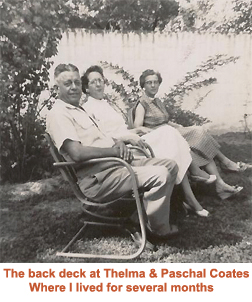 By the end of summer, Dad had contacted other members of the family and discussed the situation with them. He made arrangements with Uncle Pascal and Aunt Thelma in Marion, KY for me to go there and start my second year of high school. He contacted the stockholders and arrangements were made to bring in someone to operate our beloved Birdsong. As soon as he could be relieved after Labor Day, he went to north central Kentucky to secure a position as a funeral director. He contacted several operations and came to an agreement with Mc Carty Funeral Home in Campbellsburg. He would live in and operate Mc Carty’s facility in New Castle.
By the end of summer, Dad had contacted other members of the family and discussed the situation with them. He made arrangements with Uncle Pascal and Aunt Thelma in Marion, KY for me to go there and start my second year of high school. He contacted the stockholders and arrangements were made to bring in someone to operate our beloved Birdsong. As soon as he could be relieved after Labor Day, he went to north central Kentucky to secure a position as a funeral director. He contacted several operations and came to an agreement with Mc Carty Funeral Home in Campbellsburg. He would live in and operate Mc Carty’s facility in New Castle.
By this time, I was in my 3rd month at Marion High School but was anxious to be with Dad again so the move was made and by Christmas, we were settled into our new digs at New Castle. I started attending Henry Central High School. This was a really great school and I truly enjoyed my time there. My diploma is from HCHS. I joined the navy in 1955 and received training in Gun and Guided Missile Fire Control Systems.
I was on a cruise in the far east aboard the U. S. S. Princeton, an aircraft carrier, when I received word that Dad was in Veterans Hospital in Nashville and not expected to live. I took emergency leave and flew there. I was at the hospital when he passed away in 1956. He really never recovered from Mom’s passing and the resulting loss of Birdsong to our family. After Mom’s death, he rarely went fishing and after the move, he never fished again. I did not fish until 1999. My lovely wife rekindled my interest. She is a very good fly fisher but I am still a crank bait caster.
As I said earlier, I would very much enjoy hearing from anyone that visited Birdsong (as it was spelled then) or present visitors to Birdsong Resort. I am listed in the White Salmon, WA phonebook.

